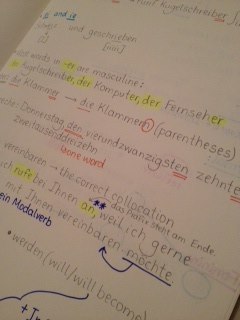
A freebie arrived in the post some time ago: a four-minute hourglass. We didn’t use it much until recently. Now it occurs to me that this might be one of the smallest “secret weapons” in your happiness projects. What can you do in 5 minutes to be happier?
This is not a complete list, but I had fun writing it. The focus is completely different from what a life coach would do. Instead of careful planning, there’s instant action. Instead of exploring how to set up great goals – just doing something. In many situations, this is what you need – life coaching can help with the big picture, but here are 10 ways to just start doing something!
1. Get up and walk somewhere. This can mean walking downstairs to make yourself a cup of tea – or walking to the printer to pick something up. The key is to do this every minute, for at least two minutes. Think that’s not enough? Some scientists are reassuring us that it’s a good start.
2. Write some 5-sentence emails. This kills two birds with one stone: you’re keeping tabs on the email monster, and you’re also making sure your missives aren’t too long. Here’s how (and why) to do it. In five minutes, some messages you’ve been meaning to send can just get crossed off a to-do list. Speaking of which…
3. Make a list (any list). Shopping, projects, calls to make, meal ideas, weekend plans – these things can grow if you set aside a solemn afternoon just for “planning.” Keep it short, though, and the discipline will make you focus on what comes to mind first. As soon as it’s out of your mind and in your trusted system – you’re a bit more free to do what makes you happy.
4. Cross a small thing of your list. Five minutes can mean two quick calls. Or cleaning one spot. Or ordering one thing online. Paying one bill. Pushing your big project one step further. Think back to step 3, above: if you know that you’ll do some work in 5-minute bursts, your lists will change to include more 5-minute steps. So you’ll feel better about making (and conquering) them!
5. Don’t just do something – stand there! This one is counterintuitive. But I bet you had moments like these. You don’t need a life coach to tell you this: sometimes just taking a break, watching the world go by, is all you need. If you find that this is helpful – use your timer for this. If you haven’t got one handy, use headphones and your favourite song!
6. Call your loved ones. Don’t text them, call them. Listen to their voice, tell them something nice. Have that good connection, then move on and notice how that made you feel.
7. Learn something exciting. 5 minutes is enough for a thorough work on 5 new Spanish words, or 5 really good lines of code, or one super-quick (and possibly super-bad!) game of chess. Don’t get me wrong: you need to set apart long stretches of deliberate practice to become really good at something. But a break in which you return to the thing that really moves you – that’s something motivating and refreshing at once.
8. Drink a glass of water, slowly. Combine with point 5 above for a good, calming break.
9. Send a thank-you message. I spent most of yesterday sending emails which were meant to get things done, chase things up, move things around…there wasn’t much joy in it. But in the evening, I had the chance to write a short message saying how grateful I was for something. This really made the difference. Shouldn’t we be doing this more often?
10. Clean up. Yes, 5 minutes is enough to make a difference! You become a tiny, super-charged cleaning monster in these few moments. Do this often enough, and you won’t need to spend an afternoon on housework quite that often.
Hungry for more ideas? Here they are: for 5 minutes, 2 minutes and 5 minutes (again.)
Hope you enjoyed it. Can you see a five-minute routine in life coaching at all? Would you benefit from doing these? Let us know!
Wiktor (Vic) Kostrzewski (MA, DELTA) is an author, translator, editor and project manage based in London. When he works, he thinks about languages, education, books, EdTech and teachers. When he doesn’t work, he probably trains for his next triathlon or drinks his next coffee.
BRAVE Learning (formerly known as 16 Kinds) is a lifelong learning and productivity blog. If you enjoy these posts, please check out one of my books and courses.
My recent publications, and my archive, is now all available on my new project: PUNK LEARNING. Hope to see you there!








